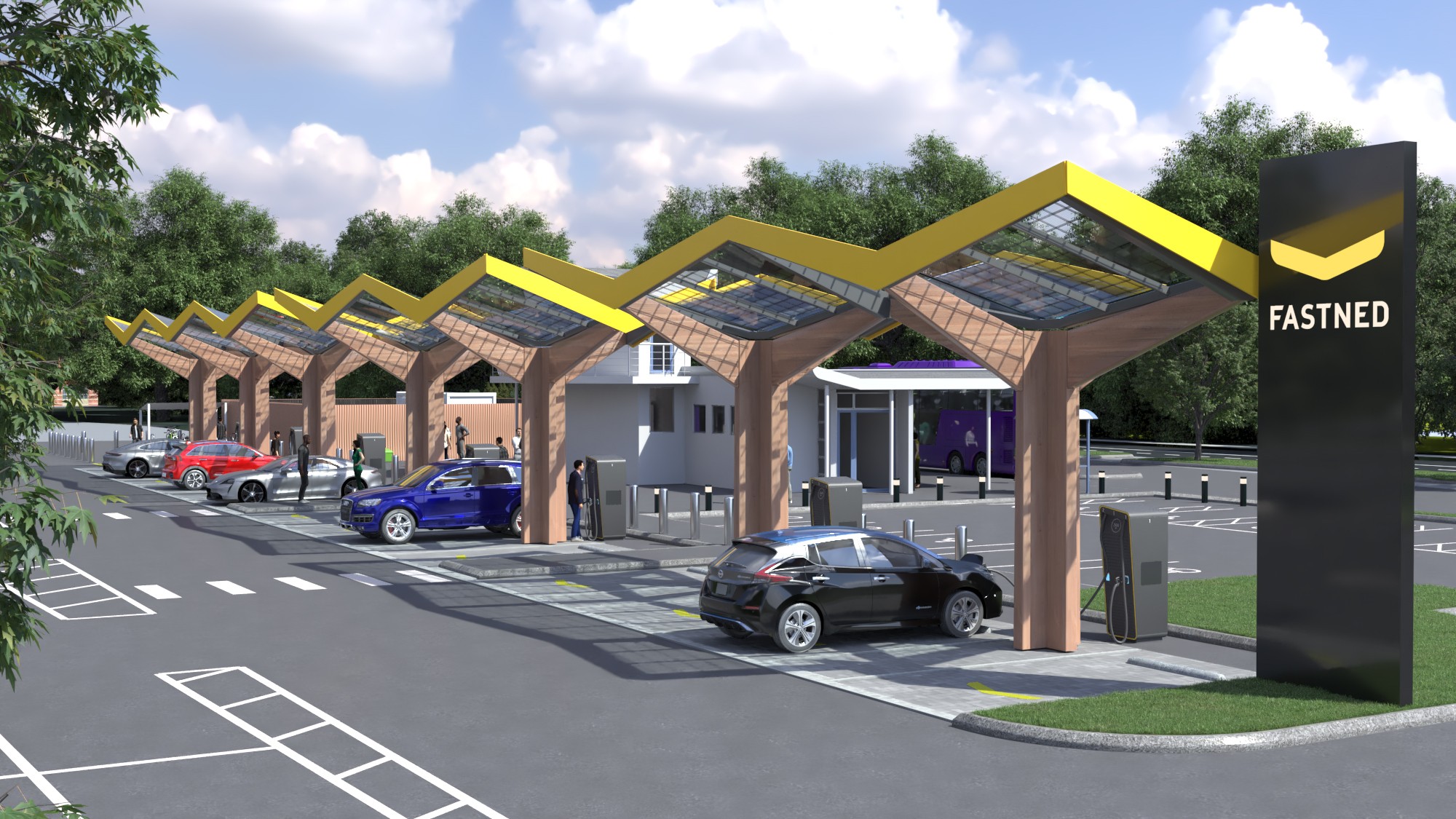
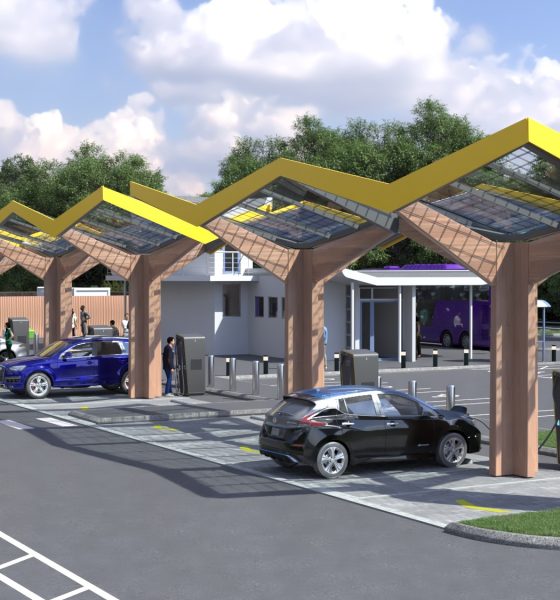
News
Tesla wind and solar-powered Superchargers come to the UK with Fastned partnership
Tesla and fast-charging company Fastned have once again partnered up to bring sustainably-powered electric vehicle chargers to the United Kingdom. The next project will be at the Energy Superhub Oxford in the United Kingdom, where 14 fast chargers capable of peak charging rates of 300 kW will be available for electric vehicle drivers.
Fastned announced the partnership with Tesla on Friday, but there are several other entities that are teaming up to bring more EV chargers to the UK. Along with Tesla, Fastned is working with the Oxford City Council, Pivot Power, and Wenea to “build and operate one of its largest fast-charging stations at the Energy Superhub Oxford.” Along with the 14 fast chargers, Tesla will install 12 Superchargers on site, according to Fastned’s press release.
Initially, 10 EVs will be able to charge simultaneously at rates of up to 300 kW. To put this into perspective, Tesla’s most powerful Superchargers are the V3 chargers it rolled out a few years ago. These are capable of 250 kW peak charging rates, which offer up to 1,000 miles of range per hour of charging. Fastned says it can expand the station with four additional chargers in the future, and the station “will become part of the growing Fastned network in the United Kingdom.”
It will be Europe’s most powerful EV charging hub with up to 10 megawatts of power available. This will open the door for a future expansion, the company noted.
The Tesla partnership with Fastned is not the first time the two companies have worked together to expand electric vehicle charging options. In October 2020, Tesla, Fastned, and the Seed & Greet Bakery opened Germany’s largest fast-charging hub with 28 total charging stalls. 20 of them were Tesla V3 Superchargers, the other 8 Fastned’s 300 kW fast-chargers.
The two locations that Tesla and Fastned have worked together to develop have utilized sustainable energy for the projects. Like the previous project in Germany, Tesla and Fastned will utilize only energy from the sund and wind, “generated partly on-site by its trademark solar canopy.”
Credit: Fastned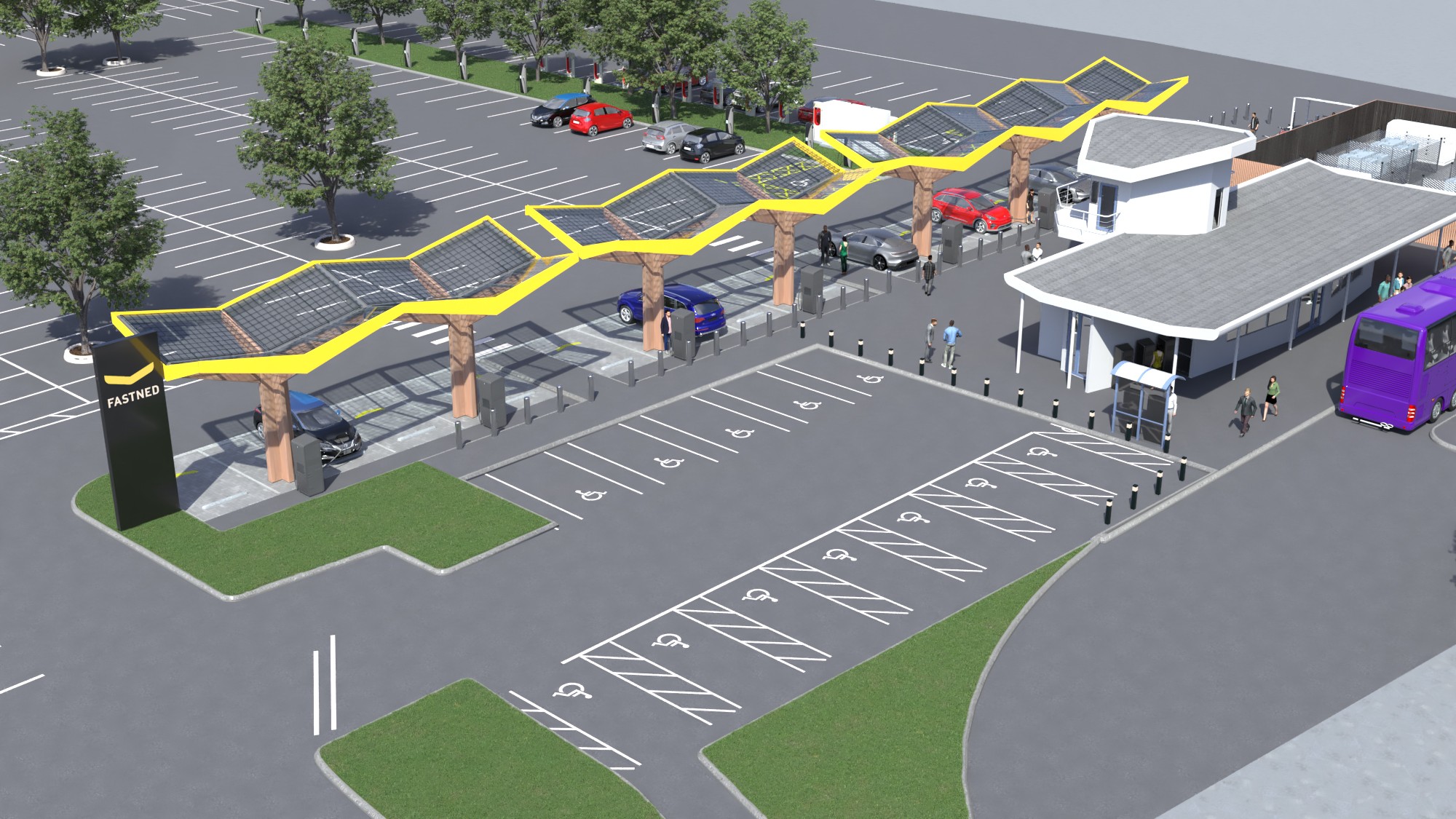
Fastned continues to expand EV charging options for UK drivers who have chosen electric powertains. According to their press release, there are still limited charging options in the region despite a growing demand for electric cars. In 2019, the EV market share in the region was only 1.7%, but this exploded to 6.6% last year.
“Our mission is to accelerate the transition towards electric mobility by giving freedom to electric drivers. EV drivers experience this freedom when they know that fast and convenient charging is omnipresent,” Fastned CEO Michiel Langezaal said. “Energy Superhub Oxford is a great initiative by the City Council that supports us in working towards that goal. We need hundreds more and will therefore continue to engage with landowners and partners such as Pivot Power across the UK. Big stations are the only way to provide charging capacity to the exponentially growing number of EVs coming to our roads.”
What do you think? Let us know in the comments below, or be sure to email me at joey@teslarati.com or on Twitter @KlenderJoey.

Elon Musk
Tesla AI5 chip nears completion, Elon Musk teases 9-month development cadence
The Tesla CEO shared his recent insights in a post on social media platform X.
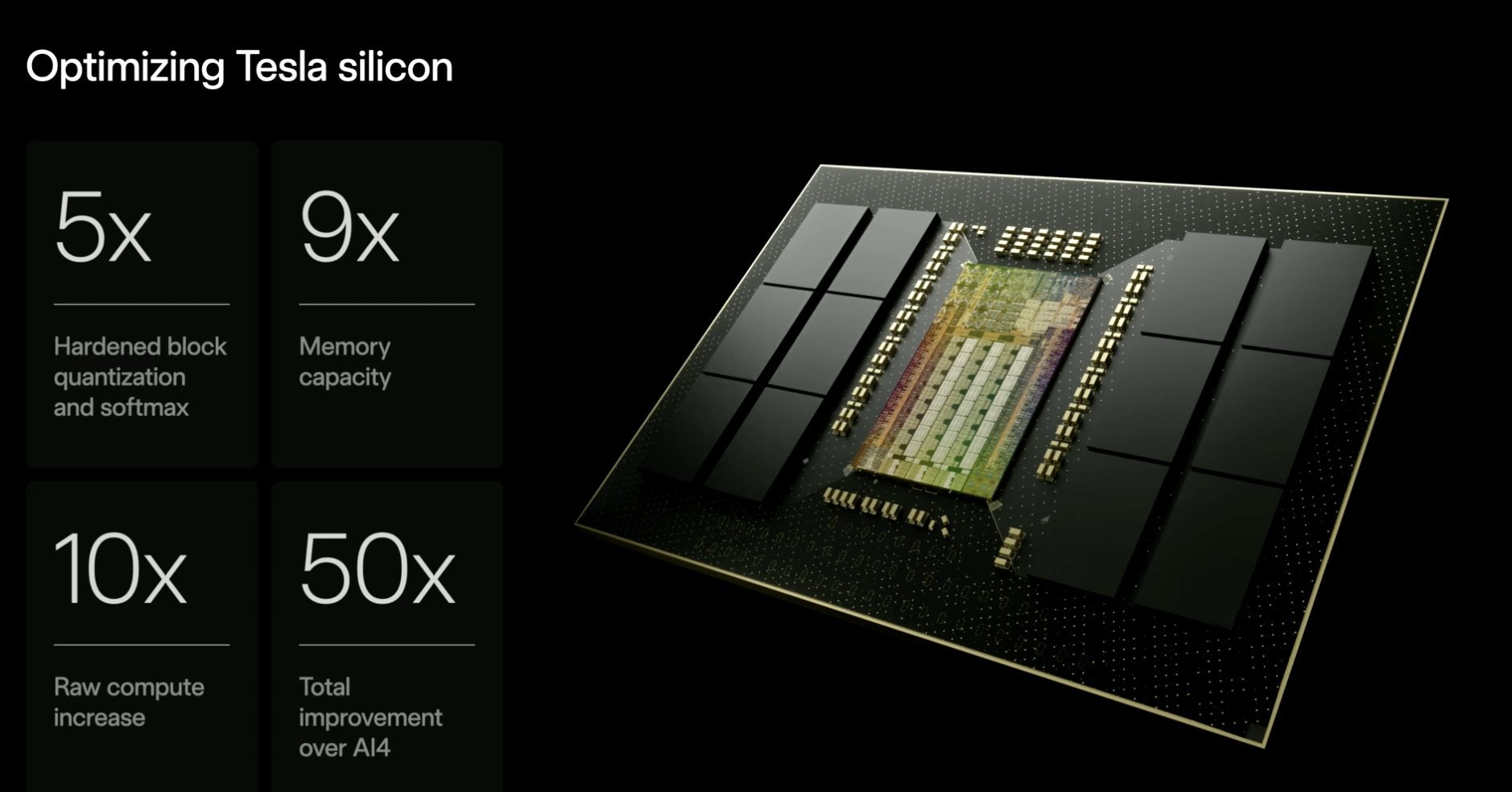
Tesla’s next-generation AI5 chip is nearly complete, and work on its successor is already underway, as per a recent update from Elon Musk.
The Tesla CEO shared his recent insights in a post on social media platform X.
Musk details AI chip roadmap
In his post, Elon Musk stated that Tesla’s AI5 chip design is “almost done,” while AI6 has already entered early development. Musk added that Tesla plans to continue iterating rapidly, with AI7, AI8, AI9, and future generations targeting a nine-month design cycle.
He also noted that Tesla’s in-house chips could become the highest-volume AI processors in the world. Musk framed his update as a recruiting message, encouraging engineers to join Tesla’s AI and chip development teams.
Tesla community member Herbert Ong highlighted the strategic importance of the timeline, noting that faster chip cycles enable quicker learning, faster iteration, and a compounding advantage in AI and autonomy that becomes increasingly difficult for competitors to close.
AI5 manufacturing takes shape
Musk’s comments align with earlier reporting on AI5’s production plans. In December, it was reported that Samsung is preparing to manufacture Tesla’s AI5 chip, accelerating hiring for experienced engineers to support U.S. production and address complex foundry challenges.
Samsung is one of two suppliers selected for AI5, alongside TSMC. The companies are expected to produce different versions of the AI5 chip, with TSMC reportedly using a 3nm process and Samsung using a 2nm process.
Musk has previously stated that while different foundries translate chip designs into physical silicon in different ways, the goal is for both versions of the Tesla AI5 chip to operate identically. AI5 will succeed Tesla’s current AI4 hardware, formerly known as Hardware 4, and is expected to support the company’s Full Self-Driving system as well as other AI-driven efforts, including Optimus.
News
Tesla Model Y and Model 3 named safest vehicles tested by ANCAP in 2025
According to ANCAP in a press release, the Tesla Model Y achieved the highest overall weighted score of any vehicle assessed in 2025.
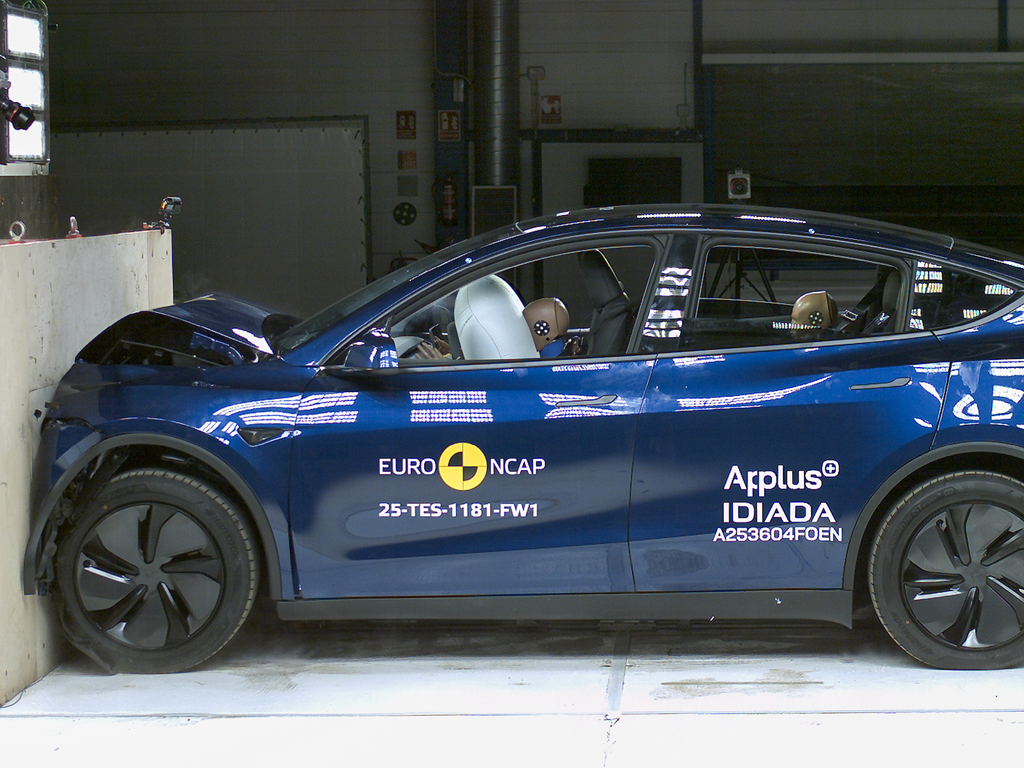
The Tesla Model Y recorded the highest overall safety score of any vehicle tested by ANCAP in 2025. The Tesla Model 3 also delivered strong results, reinforcing the automaker’s safety leadership in Australia and New Zealand.
According to ANCAP in a press release, the Tesla Model Y achieved the highest overall weighted score of any vehicle assessed in 2025. ANCAP’s 2025 tests evaluated vehicles across four key pillars: Adult Occupant Protection, Child Occupant Protection, Vulnerable Road User Protection, and Safety Assist technologies.
The Model Y posted consistently strong results in all four categories, distinguishing itself through a system-based safety approach that combines structural crash protection with advanced driver-assistance features such as autonomous emergency braking, lane support, and driver monitoring.
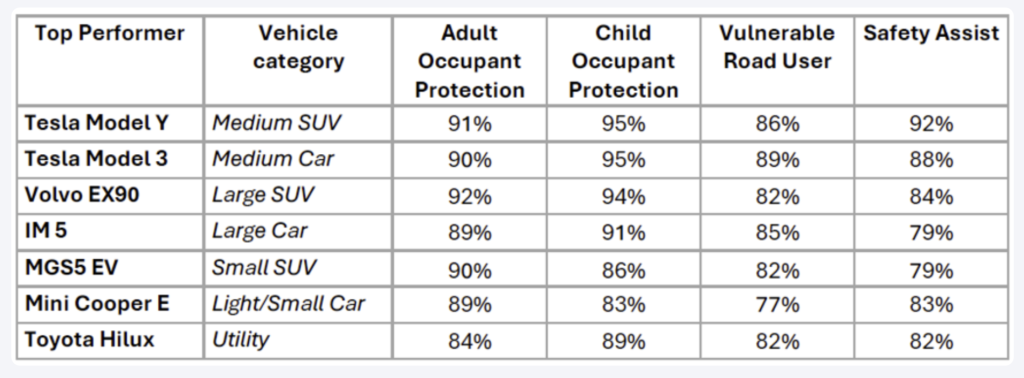
This marked the second time the Model Y has topped ANCAP’s annual safety rankings. The Model Y’s previous version was also ANCAP’s top performer in 2022.
The Tesla Model 3 also delivered a strong performance in ANCAP’s 2025 tests, contributing to Tesla’s broader safety presence across segments. Similar to the Model Y, the Model 3 also earned impressive scores across the ANCAP’s four pillars. This made the vehicle the top performer in the Medium Car category.
ANCAP Chief Executive Officer Carla Hoorweg stated that the results highlight a growing industry shift toward integrated safety design, with improvements in technologies such as autonomous emergency braking and lane support translating into meaningful real-world protection.
“ANCAP’s testing continues to reinforce a clear message: the safest vehicles are those designed with safety as a system, not a checklist. The top performers this year delivered consistent results across physical crash protection, crash avoidance and vulnerable road user safety, rather than relying on strength in a single area.
“We are also seeing increasing alignment between ANCAP’s test requirements and the safety technologies that genuinely matter on Australian and New Zealand roads. Improvements in autonomous emergency braking, lane support, and driver monitoring systems are translating into more robust protection,” Hoorweg said.
News
Tesla Sweden uses Megapack battery to bypass unions’ Supercharger blockade
Just before Christmas, Tesla went live with a new charging station in Arlandastad, outside Stockholm, by powering it with a Tesla Megapack battery.
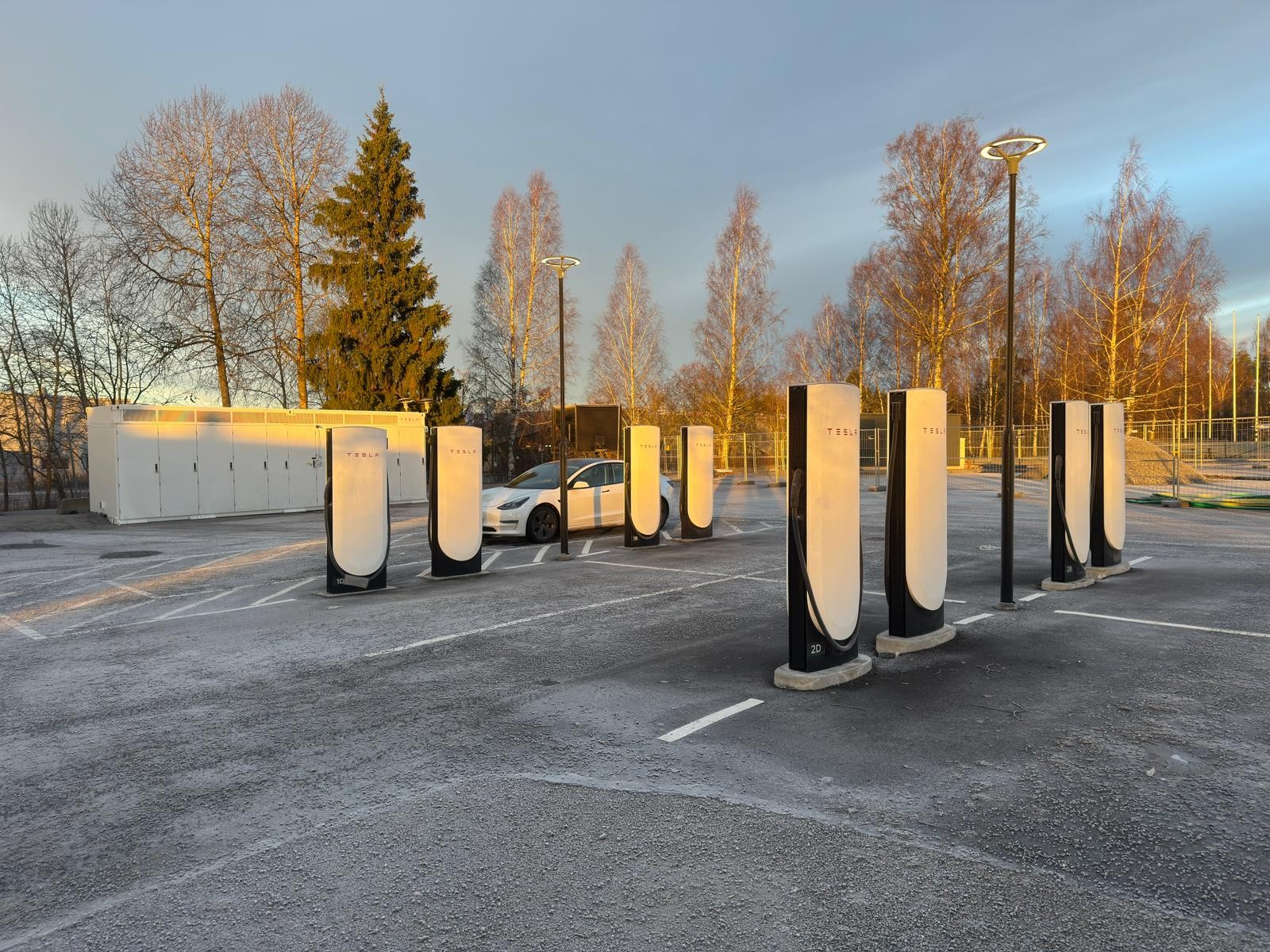
Tesla Sweden has successfully launched a new Supercharger station despite an ongoing blockade by Swedish unions, using on-site Megapack batteries instead of traditional grid connections. The workaround has allowed the Supercharger to operate without direct access to Sweden’s electricity network, which has been effectively frozen by labor action.
Tesla has experienced notable challenges connecting its new charging stations to Sweden’s power grid due to industrial action led by Seko, a major Swedish trade union, which has blocked all new electrical connections for new Superchargers. On paper, this made the opening of new Supercharger sites almost impossible.
Despite the blockade, Tesla has continued to bring stations online. In Malmö and Södertälje, new Supercharger locations opened after grid operators E.ON and Telge Nät activated the sites. The operators later stated that the connections had been made in error.
More recently, however, Tesla adopted a different strategy altogether. Just before Christmas, Tesla went live with a new charging station in Arlandastad, outside Stockholm, by powering it with a Tesla Megapack battery, as noted in a Dagens Arbete (DA) report.
Because the Supercharger station does not rely on a permanent grid connection, Tesla was able to bypass the blocked application process, as noted by Swedish car journalist and YouTuber Peter Esse. He noted that the Arlandastad Supercharger is likely dependent on nearby companies to recharge the batteries, likely through private arrangements.
Eight new charging stalls have been launched in the Arlandastad site so far, which is a fraction of the originally planned 40 chargers for the location. Still, the fact that Tesla Sweden was able to work around the unions’ efforts once more is impressive, especially since Superchargers are used even by non-Tesla EVs.
Esse noted that Tesla’s Megapack workaround is not as easily replicated in other locations. Arlandastad is unique because neighboring operators already have access to grid power, making it possible for Tesla to source electricity indirectly. Still, Esse noted that the unions’ blockades have not affected sales as much.
“Many want Tesla to lose sales due to the union blockades. But you have to remember that sales are falling from 2024, when Tesla sold a record number of cars in Sweden. That year, the unions also had blockades against Tesla. So for Tesla as a charging operator, it is devastating. But for Tesla as a car company, it does not matter in terms of sales volumes. People charge their cars where there is an opportunity, usually at home,” Esse noted.








